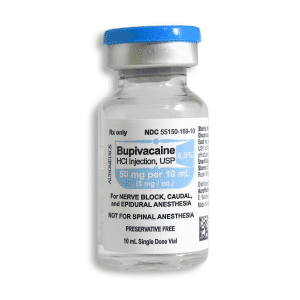Bupivacaine
Bupivacaine
Bupivacaine injection is used to numb an area of your body during surgery or other procedures, childbirth, or dental work. It is a local anesthetic.
Bupivacaine injection causes a loss of feeling and prevents pain by blocking signals at the nerve endings. It does not cause loss of consciousness.
This medicine is to be given only by or under the direct supervision of your doctor.
Before Using
In deciding to use a medicine, the risks of taking the medicine must be weighed against the good it will do. This is a decision you and your doctor will make. For this medicine, the following should be considered:
Allergies
Tell your doctor if you have ever had any unusual or allergic reaction to this medicine or any other medicines. Also tell your health care professional if you have any other types of allergies, such as to foods, dyes, preservatives, or animals. For non-prescription products, read the label or package ingredients carefully.
Pediatric
Appropriate studies have not been performed on the relationship of age to the effects of bupivacaine injection in the pediatric population. Use is not recommended in children younger than 12 years of age. Safety and efficacy have not been established.
Geriatric
Appropriate studies performed to date have not demonstrated geriatric-specific problems that would limit the usefulness of bupivacaine injection in the elderly. However, elderly patients are more likely to have low blood pressure or kidney problems, which may require caution and an adjustment in the dose for patients receiving bupivacaine injection.
Breastfeeding
There are no adequate studies in women for determining infant risk when using this medication during breastfeeding. Weigh the potential benefits against the potential risks before taking this medication while breastfeeding.
Drug Interactions
Although certain medicines should not be used together at all, in other cases two different medicines may be used together even if an interaction might occur. In these cases, your doctor may want to change the dose, or other precautions may be necessary. When you are receiving this medicine, it is especially important that your healthcare professional know if you are taking any of the medicines listed below. The following interactions have been selected on the basis of their potential significance and are not necessarily all-inclusive. Buy Bupivacaine Hydrochloride Injection USP Without Rx.
Using this medicine with any of the following medicines is usually not recommended, but may be required in some cases. If both medicines are prescribed together, your doctor may change the dose or how often you use one or both of the medicines.
- Amifampridine
- Bupropion
- Donepezil
- Fospropofol
- Hyaluronidase
- Propofol
- Propranolol
- St John’s Wort
- Verapamil
Using this medicine with any of the following medicines may cause an increased risk of certain side effects, but using both drugs may be the best treatment for you. If both medicines are prescribed together, your doctor may change the dose or how often you use one or both of the medicines.
- Alacepril
- Benazepril
- Captopril
- Cilazapril
- Delapril
- Enalaprilat
- Enalapril Maleate
- Fosinopril
- Imidapril
- Lisinopril
- Moexipril
- Pentopril
- Perindopril
- Quinapril
- Ramipril
- Spirapril
- Temocapril
- Trandolapril
- Zofenopril
Other Interactions
Certain medicines should not be used at or around the time of eating food or eating certain types of food since interactions may occur. Using alcohol or tobacco with certain medicines may also cause interactions to occur. Discuss with your healthcare professional the use of your medicine with food, alcohol, or tobacco. Buy Bupivacaine Hydrochloride Injection USP Without Rx.
Other Medical Problems
The presence of other medical problems may affect the use of this medicine. Make sure you tell your doctor if you have any other medical problems, especially:
- Arthritis or
- Back pain, chronic or
- Blood clotting problems or
- Headache, before surgery or
- Mental illness (eg, psychosis) or
- Paresthesia (nerve problem), persistent or
- Pernicious anemia, history of or
- Poliomyelitis, history of or
- Spinal problems or
- Syphilis, history of or
- Tumor, history of—Use with caution. May prevent the use of bupivacaine in patients with these conditions.
- Blood vessel disease or
- Heart disease or
- Hypertension (high blood pressure)—Use with caution. The chance of side effects may be increased.
- Glucose-6-phosphate dehydrogenase deficiency (G6PD) or
- Heart problems or
- Lung or breathing problems or
- Methemoglobinemia (blood disorder), hereditary or idiopathic (unknown cause)—Use with caution. May increase risk of having methemoglobinemia.
- Heart rhythm problems (eg, arrhythmia, heart block) or
- Hemorrhage (bleeding), severe or
- Hypotension (low blood pressure), severe or
- Infection at the injection site or
- Septicemia (blood infection) or
- During uterine contractions —Should not be used in patients with these conditions.
- Kidney disease or
- Liver disease—Use with caution. The effects may be increased because of slower removal of the medicine from the body. Buy Bupivacaine Hydrochloride Injection USP Without Rx.
Showing the single result

